A Wonderful and Significant Double-First
[Newton, Issac] Review of the Principia Mathematica, almost certainly by John Locke, "Philosophiae Naturalis Principia Mathematica. Auctore Js. Newton Trin Coll Cantab..."appearing in Jean Le Clerc and Jean Cornande de al Crose, Bibliotheque Universelle et Historique de l'annee M.D.C. LXXXVIII. Amsterdam, Wolfgang Waesberge, Boom, and van Someren, 1688, volume 8. 144x85mm, (ii), (viii), 538, (xxii), (ii). The review of the Principia appears on pp 436-450, and runs about 2000 words.
- First edition (or edition "i", meeting all points for the somewhat complicated printing history of the Bibliotheque, as found in J.R. Milton, “Locke's Publications in the Bibliothèque Universelle et Historique”, British Journal for the History of Philosophy, 05/2011, Volume 19, Issue 3).
- Bound in vellum. Some old smudging to the covers and spine, and one very old 20x10mm paper (personal?) library stamp on the spine heel, and two lines of antiquarian notes on the front paste down; also, there are two small ownership stamps at the bottom of the rear of the title page. The text is clean and crisp, and I would say that this is a lovely copy, FINE. $SOLD
(“Like its great rival, Pierre Bayle’s Nouvelles de la re´publique des lettres, it [the Bibliotheque...] was a source of information and means of communication for members of the nascent Republic of Letters. It was also one of the remote ancestors of the modern academic journal, though much less specialised than most of its successors.”--see J.R. Milton.)
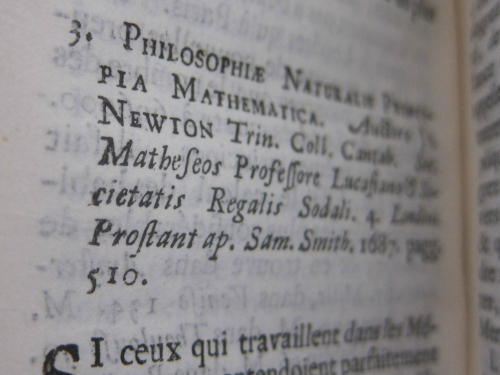
According to sources, this is the first review of Newton's Principia printed on the Continent. Edmund Halley's notice and review of the work that he saw through publication appeared in Philosophical Transactions in September 1687. There were only three other notices made in the first year (1688) following publication: they appeared in the Bibliotheque (which appeared in March), the Acta Eruditorum (in June, pp 303-315, and evidently written by Christoph Pfautz, according to Bernard Cohen) and the Journal des Scavans in (a one-page review in August). According to Hans Botts, this volume 8 appeared in January 1688 and the Newton article in March 1688. (Hans Bots, “Bibliotheque Universelle et Historique (1686-1693)” entry in Dictionnaire des journaux, 1600-1789 .)
The Bibliotheque article seems to scholars to have been certainly written by John Locke:
- "The publication in July 1687 of Newton's Principia mathematica gave rise to only four reviews in the European periodical press. The first was Edmond Halley's pre-publication notice in the Philosophical Transactions. Then a year elapsed before the Bibliotheque Universelle, the Acta Eruditorum, and the Journal des Scavans, approached the book. Of these reviews that which appeared in Jean Leclerc's widely read Bibliotheque Universelle has received least attention from historians. This is unfortunate because, of several merits, two in particular are important for the intellectual history of the period: it was written specifically for the large and growing intellectual class of western Europe who for the most part were interested in the new physical sciences, but were untrained in the mathematics necessary to understand many of the newest advances in them. And the author of this review, which was the first independent account of Newton's book to reach this Continental (largely French-speaking) audience, was John Locke, then a voluntary political exile..."--James L. Axtell, "Locke's Review of the "Principia", Notes and Records of the Royal Society of London, Vol. 20, No. 2 (Dec., 1965).
- “(Bibliotheque Universelle...) was the only journal only journal in the Dutch Republic that had published a review of the Principia, anonymously written by John Locke.”--“Newton through the eyes of an amateur”, University of Utrecht website
- The Locke Digital Bibliography project also attributes this review as a work of Locke's.
As J.R. Milton writes on Locke's work on the Principia:
- “This is anonymous, and has generally been assigned to Locke on the basis of a considerable overlap with the notes Locke himself made while reading the Principia. Some writers on Locke and Newton have firmly attributed it to Locke, while others have been rather more cautious. The question of its authorship is, however, settled by a remark – hitherto overlooked – that was made by Le Clerc in 1714 in his own review of the second edition of the Principia: ‘The first edition of this book appeared in 1687 and we published a small extract, composed by Mr Locke, in volume VIII of the Bibliotheque universelle.' “--J.R. Milton, “Locke's Publications in the Bibliothèque Universelle et Historique”, British Journal for the History of Philosophy, 05/2011, Volume 19, Issue 3.
And by the way the Journal des Scavans anonymous review was "hostile and derisive":
- The University of Florida Newton Timeline makes the following note: “1688 - An anonymous reviewer for the Journal des scavans (Paris 1688) raises objections concerning Newton's Principia, suggesting quite pointedly that the Englishman should now write a second book where he finally addresses the 'true motions [of the planets] instead of those that he [merely] assumes' [JS, August 1688: 128].”-- http://users.clas.ufl.edu/ufhatch/pages/13-NDFE/newton/05-newton-timeline-m.htm
- Bernard Cohen remarks that this anonymous person may have been Pierre Silvain Regis, “a strict Cartersian” and “a hostile critic” (Cohen, Newtonian Revolution, p 96.
- Martin Schonfeld in his The Philosophy of the Young Kant: The Precritical Project notes the JdS review as “critical and derisive” (pg 254).
ALSO in this volume:
Locke, John, “Extrait d’un livre anglois qui n’est pas encore publié, intitulé Essai Philosophique concernant L’Entendement ou l'on montre quelcertainer, et la maniere dont nous y parvenons. Communique par Monsieur Locke.” Bibliothèque Universelle et Historique 8 (1688) 49-142.
This abridgment is the first appearance of Locke's not-yet-finished Essay Concerning Human Understanding, which would appear in book form in 1689. ("Locke’s monumental An Essay Concerning Human Understanding (1689) is one of the first great defenses of modern empiricism and concerns itself with determining the limits of human understanding in respect to a wide spectrum of topics. It thus tells us in some detail what one can legitimately claim to know and what one cannot."--Stanford Encyclopedia of Philosophy.)
- “...This abridgment, Le Clerc who was naturally proud of having been the first to introduce his friend's bold arguments to the world said long afterwards pleased a great many persons and made them desirous of seeing the work at large ...”--Henry Richard Fox Bourne, The Life of John Locke, 2876, Volume 2, pp 99.
- [The first certain extract]"...est là dans la Bibliothèque universelle que paraît d abord certain extrait d un livre anglais qui n'est pas encore publié intitulé Essai philosophique concernant entendement communiqué par M Locke..."--Joseph Texte, Jean-Jacques Rouseeau et les Origines du Cosmopolitisme Litteraire etude sur les relations littéraires de la France et de l Angleterre au XVIIIe siècle. Hachette, 1895, pg 21.
- "(The e)xtract preceded publication of the first English edition, based on extract supplied by Locke, who was [thus] first known as author on the Continent."--George Watson, Ian R. Willison, eds; The New Cambridge Bibliography of English Literature, Volume 2, pg 107
- “John Locke’s earliest significant publications appeared between 1686 and 1688 in the Bibliotheque universelle et historique. They were a translation of his New Method of a Commonplace Book, an abridgment of his (as yet unpublished) Essay Concerning Human Understanding, and two reviews, of a medical work by Robert Boyle, and Isaac Newton’s Principia.”--Milton, J.R., “Locke's Publications in the Bibliothèque Universelle et Historique”, British Journal for the History of Philosophy, 05/2011, Volume 19, Issue 3.
- "Indeed the reports or extracts of books are the most numerous, but at the same time there are original contributions from some correspondents, such as The Philosophical Essay Concerning the Mind of John Locke, inserted in this journal [offered here] two years before publication of the book same (v. VIII, Jan. 1688, pp. 49-I42)”--translated from Hans Bots, “Bibliotheque Universelle et Historique (1686-1693)” entry in Dinctionnaire des journaux, 1600-1789.
- “Our author’s great work, the ‘Essay concerning Human Understanding,’ he had been employed about for some years, and he finished it in Holland about the end of the year 1687. He made an abridgment of it himself, which his friend Mr. Le Clerc translated into French, and inserted in one of his ‘Bibliotheques’ [referenced for January 1688].This abridgment was so highly approved of by all persons of understanding, and sincere lovers of truth, that they expressed the strongest desire to see the whole work.” The Works of John Locke, printed for C. and J. Rivington, et alia, London, 1824, 9th edition.
Note: editors and contributors of the Bibliotheque from start to finish included: Jean Le Clerc et Jean Cornande de al Crose, vols 1-9; Jean Le Clerc, 10, 12, 14-19; Jean Cornand de La Crose, vol 11; Charles le Cene and Jean Le Clerc, vol 13; Jacques Bernard and Jean Le Clerc, vol 20; Jacques Bernard, vols 24-5. The journal was published every 4 months in vols 1-3; every 3 in 4-19, and then twice a year for 20-25.
I inspected versions of the title page and head- and tail-pieces in other versions of this volume online, and there is a very clear distinction in the crisp quality in printing (and registration) of this volume and the others (which are described as "other editions" and "reprints")--there is a very sharp difference.


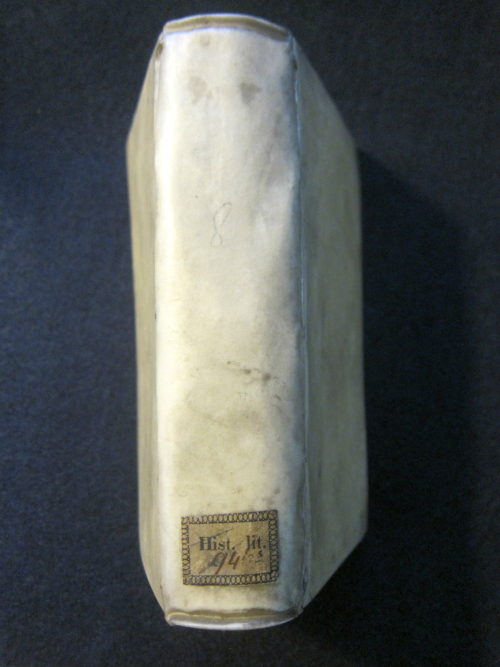
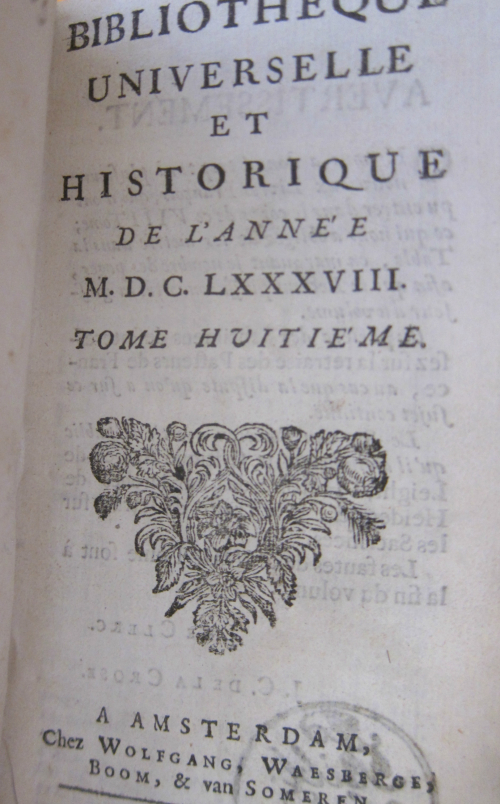
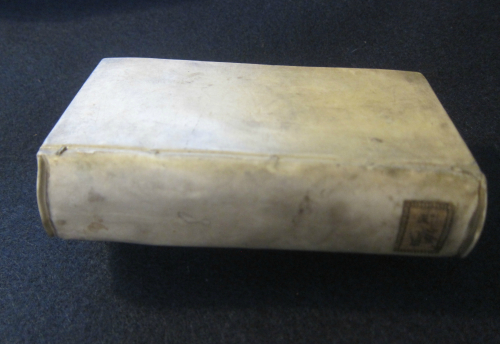
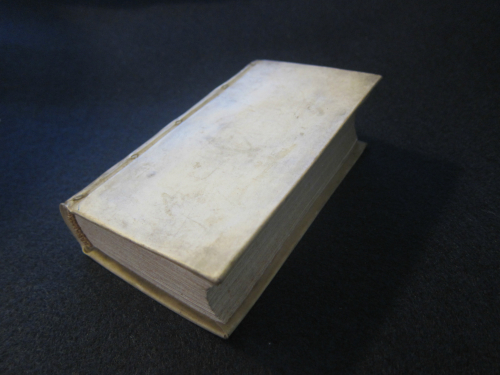


Comments